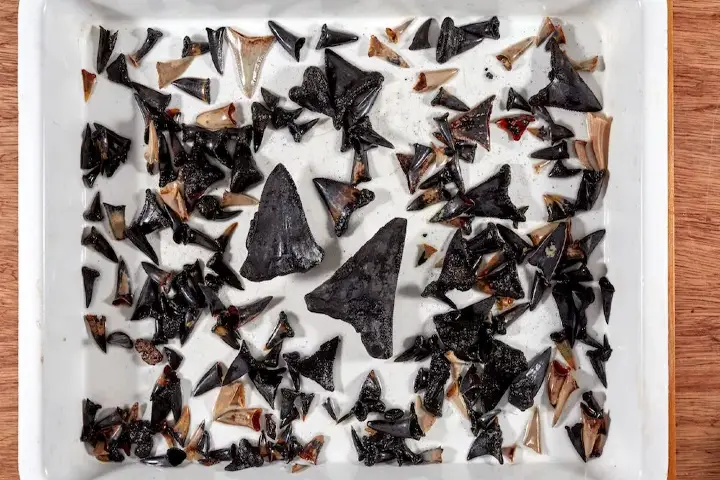

During their research, scientists collected 750 teeth of sharks from Indian Ocean (Pic. Courtesy livescience.com)
What surprise lies in store for those exploring the ocean’s depths is anybody’s guess. This became evident as per a report in livescience.com when scientists made a stunning find of shark teeth numbering in thousands at a depth of 5,400 kilometres under the Indian Ocean.
This incident took place when at the end of their month-long expedition of Indonesia’s southern tip, scientists aboard R.V. Investigator — a research vessel — sent a trawling net into the ocean’s depth with the fond hope of catching fish as part of a biodiversity survey. The vessel was operated by Australia’s national science agency, Commonwealth Scientific and Industrial Research Organisation.
Speaking about the catch with Live Science, Dianne Bray, Senior Collections Manager, Museums Victoria Research Institute said: “It was our very last sample of the trip before heading back to Australia. I was a little disappointed at first when we hauled up the net because it was filled with mud and I knew that there wasn’t going to be many fish specimens. And even if there were, they would be rumbled and damaged from all the mud.”
Going through the material, the scientists realised there was more to it than just mud. Elaborating on it, Bray said: “We tipped the contents out on the deck of the boat and as we went through everything, we found shark tooth after shark tooth. We were finding teeth from [modern] mako and [great] white sharks, but also fossilized teeth from ancient sharks like the immediate ancestor of the giant megalodon shark.”
The total number of teeth was more than 750 and their size ranged from 1 centimetre to 10 centimetre which was a single tooth belonging to megalodon’s ancestor. The teeth were in good condition. “It’s quite remarkable. The teeth weren’t weathered, rumbled or tumbled. Bacteria consumed all of the organic matter from the teeth and the roots were gone, but otherwise the enamel was left,” informed Bray.
While unable to suggest the reason for this huge collection of sharks’ teeth in the ocean, researchers think it is not due to the death of hundreds of these fish there. As per Gareth J. Fraser, lecturer in Evolutionary Developmental Biology at United Kingdom’s University of Sheffield, sharks have an endless supply of teeth that are replaced “like a conveyor belt”.
The most probable reason for this huge collection is that the area was home to a community of ancient sharks. “The teeth were found on an abyssal plain and not out in the open ocean. This area was part of an ancient reef covered with seamounts and we think a community of sharks swam around this area long ago,” remarked Bray. The teeth were the used-up ones that had been dropped by these creatures.
Bray pointed out that this haul has barely “scraped the surface” of lies buried there.
Taiwan's Armed Forces staged a powerful demonstration of military readiness on Saturday, simulating a Chinese…
In a significant milestone for global healthcare innovation, the World Health Organization (WHO) has released…
The Balochistan Liberation Front (BLF) has claimed responsibility for a sweeping wave of armed assaults…
Union Minister of State for External Affairs Pabitra Margherita reaffirmed the "strong and enduring bonds…
Prime Minister Narendra Modi on Saturday distributed over 51,000 appointment letters to newly appointed youth…
Union Health Minister and BJP National President JP Nadda engaged with the Chairman of the…